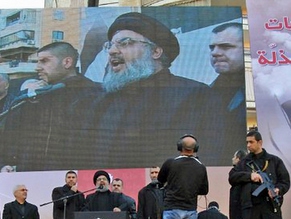|
World Jewish News

Nasrallah last appeared in public in July 2008, when five Lebanese prisoners were released by Israel [AFP]
|
Hezbollah chief makes rare public appearance
06.12.2011, Israel and the World Hassan Nasrallah, the head of Lebanon's Hezbollah group, has made his first public appearance for more than three years at a rally in Beirut.
The leader has rarely been seen since his group helped battle Israel in a month-long war in 2006, fearing Israeli assassination.
Since then, he normally communicates with his followers and gives news conferences via satellite link-up.
Nasrallah was seen walking through a throng of people in a southern Shia stronghold in Beirut on Tuesday before he addressed a crowd marking the religious festival of Ashoura - a major religious festival which commemorates the martyrdom of Imam Hussein, a grandson of the Prophet Muhammad.
He said his public appearance in the suburb of Dahiya was a message to those who believed they could "threaten us".
'Here to stay'
"I wanted to be with you for a few minutes ... to renew our pledge and for the world to hear us," Nasrallah said.
He said Hezbollah was "here to stay" and would never give up its weapons.
"We are increasing in numbers and in weapons ... and for those who are betting that our weapons are rusting, we say that our weapons are being renewed," he said.
A smiling Nasrallah then left the podium, telling tens of thousands of supporters he would reappear in few minutes on a giant screen for a longer speech.
"See you in few minutes," he joked to his followers before he left.
His appearance is meant to portray confidence at a time of upheaval in the Middle East, and particularly in Syria, which along with Iran is Hezbollah's main backer.
Many Syrians and Arabs around the region have in recent years elevated Nasrallah to the status of a nationalist hero after the success of Hezbollah fighters against Israel in 2006.
Since the Syrian uprising, however, many Syrians have unleashed their anger at Hezbollah over its support for President Bashar al-Assad's rule.
Some protesters in Syria have set fire to the yellow flag of Hezbollah and pictures of Nasrallah.
'Ready to die'
In a speech broadcast on large screens shortly after his departure, Nasrallah vowed his group would continue to arm in the face of possible "regional change," hinting at neighbouring Syria.
"A message to all those who are conspiring against the resistance and banking on change [in the Arab world] ... We will never let go of our arms," he said.
"We are tens of thousands of trained fighters, who are all ready to die.
"Day after day, the resistance gains more fighters, trains better fighters and arms even more heavily. Every weapon that rusts is replaced."
Many observers say the Syria crisis, which is threatening to topple Assad, has dealt a severe blow to the Lebanese group.
Nasrallah lashed out at the US for seeking to destroy Syria in order to "make up for its defeat in Iraq".
"The United States has tried to portray itself as the defender of human rights and democracy in the Arab world," he said.
"These charlatans and hypocrites are known for their support of all dictatorships that collapse and for disowning these dictatorships immediately after they collapse.
"This is the character of Satan."
'Exceptional relationship'
Nasrallah renewed his vow to stand by Assad and lashed out at the Syrian National Council, the main anti-Assad opposition group, for aiming to "destroy Syria" while moving closer to Washington and Israel.
"The so-called Syrian National Council, formed in Istanbul, and its leader Burhan Ghalyoun ... are trying to present their credentials to the United States and Israel," Nasrallah said.
His comments came after Ghalyoun was quoted as saying a Syria run by the country's main opposition group would cut military ties to Iran, Hezbollah and the Palestinian movement Hamas.
"There will be no special relationship with Iran," Ghalyoun, a 66-year-old university professor, told the Wall Street Journal, in an interview published on Friday.
"Breaking the exceptional relationship means breaking the strategic, military alliance," he was quoted as saying. "After the fall of the Syrian regime, [Hezbollah] won't be the same."
Al Jazeera
|
|
